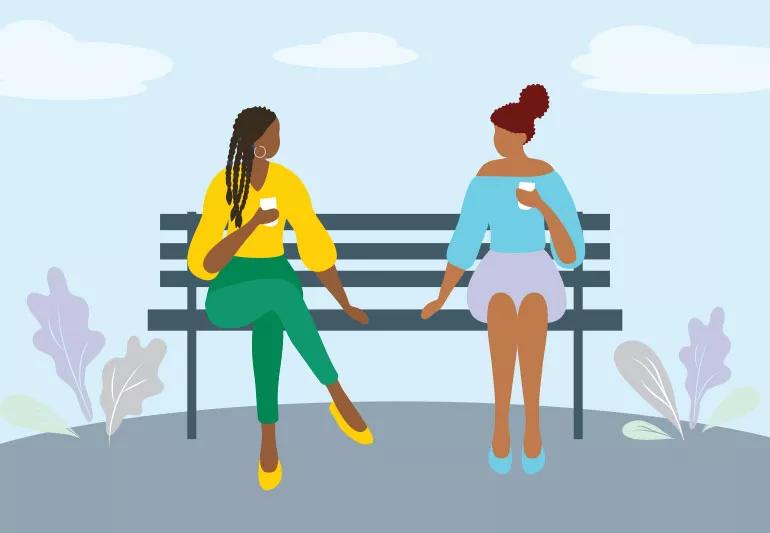Notetaking, intention setting and practicing with friends can help you be a better listener

Have you ever tried to have a serious conversation with somebody who obviously isn’t paying attention to you? Chances are, we’ve all been on both sides of that equation. Listening isn’t always easy. In fact, listening is a skill that we all have to practice.
Advertisement
Cleveland Clinic is a non-profit academic medical center. Advertising on our site helps support our mission. We do not endorse non-Cleveland Clinic products or services. Policy
We talked to registered psychotherapist Natacha Duke, RP, about active listening: What it is, why it matters, how to practice it and what to do if you don’t feel like your listening skills are improving.
You might not be familiar with the term “active listening,” but you probably know what it feels like.
Duke defines active listening as “listening with the intent to really understand how the person is feeling and be able to put yourself in their shoes to empathize with them.”
We sometimes think of listening as passive, but that’s not accurate. When somebody’s actively listening, they’re doing a lot. And — just as importantly — they’re not doing other things, because active listening requires your full focus and attention. That can be a tall order in a world that’s chock full of distractions.
Some people are better at active listening than others. And some people have to use active listening more in their day-to-day lives than others. Teachers, therapists and barbers need to be able to engage with and really hear other people all day, every day, as part of their jobs. But everybody needs these skills. Whether you’re navigating work, family, romantic or other personal relationships, being good at actively listening to others has many benefits:
Advertisement
We’ve compiled some tips for being a better listener. Remember, though: It’s important not to treat these different actions as a checklist. If you’re focused on crossing off each item on this list, you’re not focused on the discussion you’re having at that moment!
Instead, make a point of practicing these skills now with people you know and trust, so they feel more natural when the time comes for deeper engagements.
“I like to set an intention for any conversation,” Duke says. What kind of intention you set depends on the kind of conversation you’re having.
Keep in mind, an intention is open-ended — where the conversation goes will depend on what the other person says. Instead of saying, “I want to prove that I’m right,” for example, you might say, “I want to better understand why my colleague disagrees with me.”
It may seem obvious that you need to “be present” in a conversation, but it’s often easier said than done. So, how can you make sure your mind and body are in the same place — and focused on the right thing?
“I think the very first thing that I would do is get rid of your phone and other distractions,” Duke advises. “Even if you’re listening, having your phone in front of you communicates to the other person that what they’re saying is not important to you. So, make sure that you’re setting yourself up for successful active listening and that the person really has your full attention.”
Advertisement
Striving to be present is awesome. But even the best listener can’t pay 100% attention at all times.
As Duke puts it, “Mindful presence involves coming back to the moment, time and time again. Because our minds will wander. We’re human.”
One way to stay firmly in the moment is to ask questions. Those questions may involve reflecting back on what somebody said to ensure you’re understanding them correctly, asking them to elaborate on a point they made or inquiring as to how they feel about what they’re saying.
“When we’re asking questions,” Duke says, “We’re really communicating to the other person that we’re understanding enough to ask insightful questions. In demonstrating our understanding, we might even bring up feelings or thoughts for them that they didn’t know they had. So, you’re creating a deeper rapport.”
Many people struggle to stay in the moment because they’re too busy thinking about the next thing they’re going to say.
“Part of active listening is ridding yourself of that pressure — the pressure of needing to come up with some brilliant response,” Duke says. “If you’re thinking about your response, you can’t be listening.”
Most people will find this particular component of active listening difficult to do, as thinking about responding instead of listening is at least partially about anxiety. But if you can silence that inner voice, it will communicate volumes to the person you’re interacting with.
Advertisement
“Not having a prepared response shows that you’re a learner, that you’re vulnerable, that you may not know the answer and that you’re also willing to learn,” Duke explains.
In order to be truly willing to learn, you need to be open to hearing other people’s perspectives. That’s not easy, especially if you’re talking about difficult topics — and even more so if there’s a power imbalance between you and your conversation partner. Just like all of our minds wander from time to time, we all pass judgment. The key to being a good listener is recognizing it when it’s happening and purposefully adjusting your attitude.
For example, if what you’re hearing is making you feel defensive or upset, you may need to step away from the conversation or reset your intention — in your mind or out loud. Remember that in active listening, the goal of the conversation is to understand, not to “win.”
“Having a welcoming posture and body language shows that you’re open to receiving what the other person is saying and that you are taking a nonjudgmental, noncritical stance,” Duke explains.
So, how do we communicate that we’re engaged through our posture?
Advertisement
Depending on the time, place and circumstances, taking notes is a great way to maintain focus, limit distraction and demonstrate that you value what someone is saying. It can be especially helpful if you have any issues with your memory.
We can all benefit from improving our listening skills, but it may be especially important if you have a condition that affects your ability to communicate with others. Attention-deficit/hyperactivity disorder (ADHD) and autism spectrum disorder (ASD) are two common examples of conditions that can affect your active listening skills. Even more common: Mental health issues like anxiety and depression.
“Inattention can be a symptom of depression or anxiety,” Duke explains. “When you’re feeling depressed or anxious, it can be really hard to be present in conversations because you’re ruminating about so many different things.”
If you struggle with active listening for any reason, that’s OK. You can improve your skills with practice.
“Practice with someone whom you trust,” Duke suggests. “Take someone, be it your sister or your friend or whoever, and have a go at it. Ask them to create some sort of monologue — some sort of problem — and try reflecting back to them what you’re hearing. Ask questions. Practice being present with them.”
And when you’re done, Duke notes, you get the opportunity to learn again. “Ask them about the experience. ‘Did you feel like I was hearing you? How did you feel when I was listening to you today?’ Get some feedback from them about what you did well and where you can improve.”
If you struggle with communication because of a cognitive, attention or mental health disorder, understanding it may be the key to improving your active listening skills.
“People with ADHD are frequently more visual in their learning,” Duke further explains. “So, it can sometimes be helpful for them to practice visualizing the story they’re being told as they’re hearing it. For other clients with ADHD whom I’ve worked with, it’s really helpful to take notes. If you can’t take notes with pen and paper, you might try to summarize what someone said, or ask if they can reflect back to you their three main points. The approach depends on the relationship.”
Depending on how comfortable you are being vulnerable with the person you’re speaking with, you may also want to be honest about the times when your attention drifts.
“You can say, ‘Can you please repeat what you just said? I want to be sure that I understood,’” Duke recommends. “You don’t have to be a perfect listener.”
Most people can improve their active listening skills by self-teaching, reading books, taking online courses or practicing with the help of a trusted confidant. But what if you aren’t improving? What if your listening skills are causing problems in your personal or professional life?
“At that point, I think it’s a bigger concern,” Duke says. “If people are telling you that you’re not listening to them; if your partner, your friends, whoever, are stepping up and saying something — or even if you’re just noticing it yourself — then, it might be appropriate to look at being assessed. Maybe there is something going on, like a learning or attention deficit.”
If you are interested in being assessed, your next step after reading this article would be reaching out to a healthcare provider, or — if you have one — a therapist. If it turns out that you do have a condition like ADHD, ASD, depression or anxiety, you may find that getting proper treatment or support will improve your ability to engage in active listening.
Active listening is a teachable skill, one that we all need to practice on a regular basis to promote happy and healthy relationships. But that doesn’t make it easy. In fact, it can be quite hard to engage with people on a deeper level.
No matter how “good” a listener you are, the fact that you’re thinking about active listening is a sign that you’re doing a great job.
“Recognize yourself for even wanting to be a better listener, wherever you are in the process,” Duke encourages. “Extend yourself some self-compassion for even wanting to improve, because not everyone is willing to grow. Not everyone cares enough to want to improve their listening.”
Caring about listening speaks volumes about you. And we hear it loud and clear.

Sign up for our Health Essentials emails for expert guidance on nutrition, fitness, sleep, skin care and more.
Learn more about our editorial process.
Advertisement

When someone has a quality or trait you admire, you may assume they have other unrelated positive qualities, too

Be cautious when others try to influence your decisions — especially if it goes against your values

When interacting with a challenging person, it’s best to lead with empathy, stay calm and set boundaries

This method of changing how you present yourself to fit in comes with pros and cons

‘Mind your manners’ by watching your language, challenging your assumptions and apologizing when you fall short

Role-playing, creating social opportunities and celebrating little wins can all help ease shyness

Look to activities you enjoy — or try a new hobby — to help foster meeting new people

If the thought of the gym sends you spiraling, do some prep work beforehand and bring a friend along for support

Even small moments of time outdoors can help reduce stress, boost mood and restore a sense of calm

A correct prescription helps your eyes see clearly — but as natural changes occur, you may need stronger or different eyeglasses

Both are medical emergencies, but they are very distinct events with different causes